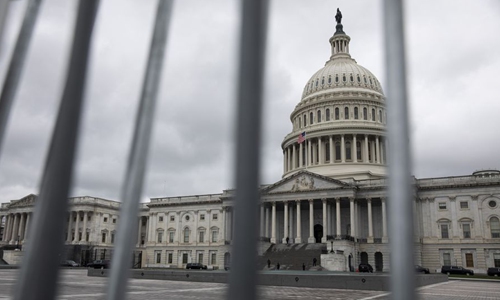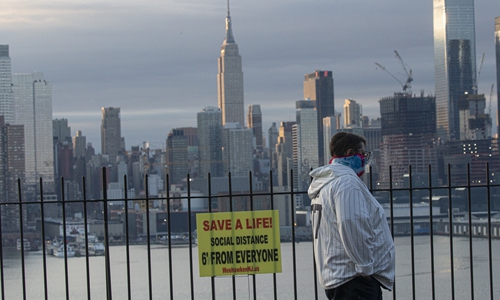Post-pandemic animosity by US
By Yan Yunming and Xie Wenting Source:Global Times Published: 2020/5/8 23:38:40
China advised to stay alert for futile 'new McCarthyism'

Photo taken on March 25, 2020 shows the US Capitol in Washington D.C., the US. Photo: Xinhua
In the face of the upcoming presidential elections, Republicans launched a new China Task Force committee in US Congress on Thursday to attract attention despite its futile efforts to pass the buck amid the pandemic. But this not-so-surprising move only shows how hysterical and desperate Republicans have become as criticism of the government's mishandling of the domestic coronavirus outbreak increases, experts said.
Following a series of anti-China moves the Trump administration has made when its epidemic prevention spiraled out of control with more than 1.2 million infections - the world's largest number - to date, House Minority Leader Kevin McCarthy announced on Thursday a proposal to set up a new "China Task Force" which will develop legislative policies to curtail Chinese influence. The committee currently consists of 15 Republicans with no Democrats joining.
McCarthy said the pandemic made it apparent "for a national strategy to deal with China." The task force will hold meetings and briefings on China-related issues, which include China's influence inside the US, presence on American campuses and control over important supply chains, the Washington Post reported.
A search for the members in the China Task Force revealed their antagonism toward China. One of them is Rep. Elise Stefanik, who in late April asked Secretary of State Mike Pompeo and the attorney general to bring China to the International Court of Justice for the handling of COVID-19, according to a report by The Adirondack Daily Enterprise.
Analysts said setting up the new China committee is the Republicans' new tactic to fuel anti-China sentiment, but this won't help stop power from shifting from the West to East, which was happening before the pandemic. The pandemic is very likely to speed up this process.
Democrats not joining the committee does not mean they are more China-friendly, but they don't want Republicans to shift the focus of President Donald Trump's failure to handle the pandemic. Since last year, both parties passed several bills regarding China's Xinjiang and Hong Kong, interfering in China's internal affairs, Diao Daming, an associate professor at the Renmin University of China in Beijing, told the Global Times on Friday.
Diao noted the Democrats in the Congress won't endorse the legislation but will support other anti-China measures that the new committee aims to push forward.
"The pandemic will very likely further weaken the US and strengthen China," he said.

A man covering his face walks in Manhattan, New York on April 6 amid the serious outbreak of COVID-19 in the US. Photo: AFP
Treating China as equalsIn the past months, certain American politicians, including Pompeo, kept passing the buck, making groundless accusations that China was responsible for the outbreak, and hyped conspiracy theories by calling it the "China virus" to claim the virus originated from a Wuhan lab. At Friday's media briefing, Chinese Foreign Ministry spokesperson Hua Chunying joked that the press conference was almost all about refuting Pompeo's lies.
The extreme atmosphere has made many people in the US worry for a return of the McCarthy era, where free speech in the country was curtailed. A former US Ambassador to China pointed out in a CNN interview the US is now similar to Germany in the 1930s.
Li Haidong, a professor at the Institute of International Relations of the China Foreign Affairs University, told the Global Times on Friday the task force will fuel the existing unfriendly atmosphere toward China at the local level in the country.
Trump administration's China policy focuses on conflicts, and the task force could further aggravate tensions, he said.
Former US Ambassador to China Max Baucus said in an interview with CNN that "The [Trump] administration's rhetoric is so strong against China. It's over the top. We're entering a kind of an era which is similar to Joe McCarthy back when he was red-baiting the State Department, attacking communism."
"A little bit like Hitler in the 30s. A lot of people knew what was going on was wrong. They knew it was wrong, but they didn't stand up and say anything about it. They felt intimidated," he said.
Analysts warned that China needs to stay alert as the US is trying to create a new McCarthy era of international repression on China.
But, on the other hand, we should be aware that most countries won't follow the US, Li said.
"It's difficult for the US to mobilize the world against China. People know how selfish and self-centered the US is. So only a few of its allies will join," he told the Global Times.
The US interception of other countries' anti-virus medical supplies and pointing a finger at the WHO when international cooperation is urgently needed occupied world headlines.
Meanwhile, the Chinese government had provided over 150 countries and international organizations with supplies, hosted over 120 video conferences with health experts from more than 160 members of the international community, and dispatched 19 medical groups to 17 countries, according to the Zhang Ming, Chinese Ambassador to the European Union, at a Coronavirus Global Response pledging event on Monday.
Li told the Global Times that most countries, including its traditional allies, such as Germany and France, have different demands from the US. So they won't join this wave.
As early as February 1, the European Union had dispatched tons of medical supplies to assist China. And in March when the continent was hit hard, China immediately provided more than 2 million protective masks and sent medical groups. Positive reactions were constantly heard in Europe on China.
Meanwhile, it has been reported that China faces a rising wave of hostility led by the US amid the pandemic. The discrimination against Chinese people is growing in some parts of the world.
Li said "The rising hostility shows some Western countries are not accustomed to a rising China. It's a challenge for them to learn to see China on an equal footing, which adds to their anxiety."
He added that they need to learn to respect differences and deal with other countries equally.
Analysts noted that China should step up efforts to enhance its own capabilities in high-tech, military and other fields. It should also conduct far-reaching international cooperation and uphold multilateralism to share its benefits with other countries, rather than being distracted by the anti-China wave.
Cooperation amid competition
The task force on China is not the first one in the West. On April 24, several UK Conservative MPs launched a "China Research Group" to promote "factual debate" in dealing with the "rapidly changing nature of the relationship" between China and the UK. The group would attempt to look "beyond" the coronavirus pandemic to "examine China's long-term economic and diplomatic aims," BBC reported.
Kevin Hollinrake, an MP and a member of the group, told the Global Times that the group will make some inquiries on specific policy areas. The group will look at, for example, how the Chinese political system and business work.
It will look at certain work streams and develop fact-based reports based on those work streams. "They may be reported back to parliament or published in the public domain," Hollinrake said.
Although the group was set up at a time when the virus was rampant in the UK, "the pandemic itself is not the underlying issue," Hollinrake noted.
The China Research Group is likely to "lobby for a less cooperative approach to China, and for the UK to align more with the US on China policy," Tim Summers, senior consulting fellow on the Asia-Pacific program at Chatham House, told the Global Times.
However, Chris Wood, the British Consul General in Shanghai, told the Global Times that "We will see continued discussions and collaboration. There is no global challenge that can be solved without China's participation. We recognize that we very much want to work with China on these big global issues, and that will continue."
In the post-coronavirus era, China and Europe might continue to seek cooperation amid competition, analysts said, pointing out that Europe's anxieties are, to a large extent, provoked by the US.
In the early stages of the pandemic, despite old disputes, cooperation was the mainstream in China-Europe interactions. But things have changed since the US became the new epicenter, Sun Keqin, a research fellow at the China Institutes of Contemporary International Relations, told the Global Times.
Sun told the Global Times that to reduce the negative influence from the US on European countries, China needs to make efforts to let its voice heard in international public opinion and seek cooperation opportunities. What the US is advocating is nothing but rumors and conspiracy, and China must smash these lies with sound and reasonable evidence and awaken European countries, Sun said.
RELATED ARTICLES:
Posted in: DIPLOMACY